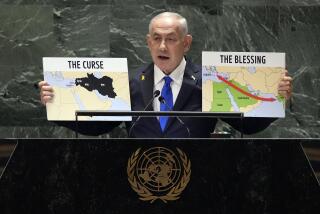President’s goal now defined as ‘success’ -- not ‘victory’
- Share via
WASHINGTON — For more than four years since the invasion of Iraq, President Bush most often has defined his objective there with a single, stirring word: “Victory.”
“Victory in Iraq is vital for the United States of America,” he told cadets at the U.S. Coast Guard Academy in May. “Victory in this struggle will require more patience, more courage and more sacrifice,” he warned National Guardsmen in West Virginia in July.
But this week, the word “victory” disappeared from the president’s lexicon. It was replaced by a slightly more ambiguous goal: “Success.”
“The success of a free Iraq is critical to the security of the United States,” Bush said Thursday evening in his brief televised address from the Oval Office.
“Now, because of the measure of success we are seeing in Iraq, we can begin seeing troops come home,” he said.
Bush’s description of his war aims reflected two hard realities about his position on Iraq.
First, a large majority of the American public does not believe “victory” is possible. Dozens of opinion polls have found that fewer than 40% of voters think the war can be won.
Second, the men who are running the war -- Army Gen. David H. Petraeus and U.S. Ambassador Ryan C. Crocker -- made it clear this week that their immediate goals were more limited than “victory.”
Where the United States once hoped for a peaceful, united Iraq governed by a Western-style parliament, Petraeus and Crocker described more modest goals: reducing sectarian violence, avoiding all-out civil war and encouraging self-rule with a strong role for tribal sheiks who are not elected.
“I cannot guarantee success in Iraq,” Crocker said in hearings before Congress. “The challenges. . . are immense.”
Petraeus shied away from even using the word “success.” When a senator asked whether the United States had “a realistic chance to be successful” in Iraq, the general carefully replied: “I believe we have a realistic chance of achieving our objectives.”
A senior official said the two men had deliberately chosen to be “minimalist” in their promises, recognizing that prior talk of victory had left many Americans disillusioned or doubtful.
The formal reason for the president’s speech was to endorse Petraeus’ proposal to begin a long-planned troop drawdown slightly ahead of schedule. The plan will leave more than 130,000 troops in the battle zone next year, unless Petraeus and Bush decide further withdrawals are possible.
But Bush’s underlying aim was to regain the initiative in Washington’s political battles about the deeply unpopular war -- by convincing Americans that the military effort is making progress, that patience and persistence will make further troop withdrawals possible, and that there is, in short, a light at the end of the tunnel.
“The principle guiding my decisions on troop levels in Iraq is ‘return on success,’ ” Bush said. “The more successful we are, the more American troops can return home.”
“He obviously wants to get our position in Iraq to a point where it’s in a good place for the next president to come in,” said a senior administration official who, like others, asked not to be named when discussing Bush’s thinking.
Bush expressed a hope that his decision to allow the drawdown of troops to occur on schedule would bring supporters and critics of his policies together.
“The way forward I have described tonight makes it possible, for the first time in years, for people who have been on opposite sides of this difficult debate to come together.”
There was no sign that such a hope would soon be realized. House Speaker Nancy Pelosi of San Francisco and other Democrats denounced Bush’s proposal even before he spoke. Pelosi called it “a path to 10 more years of war in Iraq.”
But Bush’s target was not so much his opposition in the Democratic Party as the increasing number of war critics in his own Republican Party. Bush’s plan for drawing down the troops, one aide said, should make it possible for members of Congress “to be for success in Iraq and for beginning to bring troops home.”
Bush acknowledged that Iraq’s central government has failed to meet the goals for political reform that were set at the beginning of the year. But he noted that progress had been made in restoring security to parts of Baghdad and in the provinces of Anbar, west of the capital, and Diyala, to the northeast.
White House officials have said that the progress in those parts of Iraq drew substantial media coverage during the summer and appeared to bolster Republican support in Congress for the war.
The White House’s challenge, a former aide said, is to convince Americans that any kind of success is possible in Iraq.
Bush must “overcome a fair amount of skepticism in the conventional wisdom, which thinks all experts believe it is hopeless,” said Peter D. Feaver, a professor at Duke University who worked on Iraq policy at the National Security Council.
“They’re still making the two basic points,” he said. “One, we can win -- something like success is still possible. Two, the consequences of failure are so bad we should be willing to pay a price to win.”
--
More to Read
Get the L.A. Times Politics newsletter
Deeply reported insights into legislation, politics and policy from Sacramento, Washington and beyond. In your inbox twice per week.
You may occasionally receive promotional content from the Los Angeles Times.











